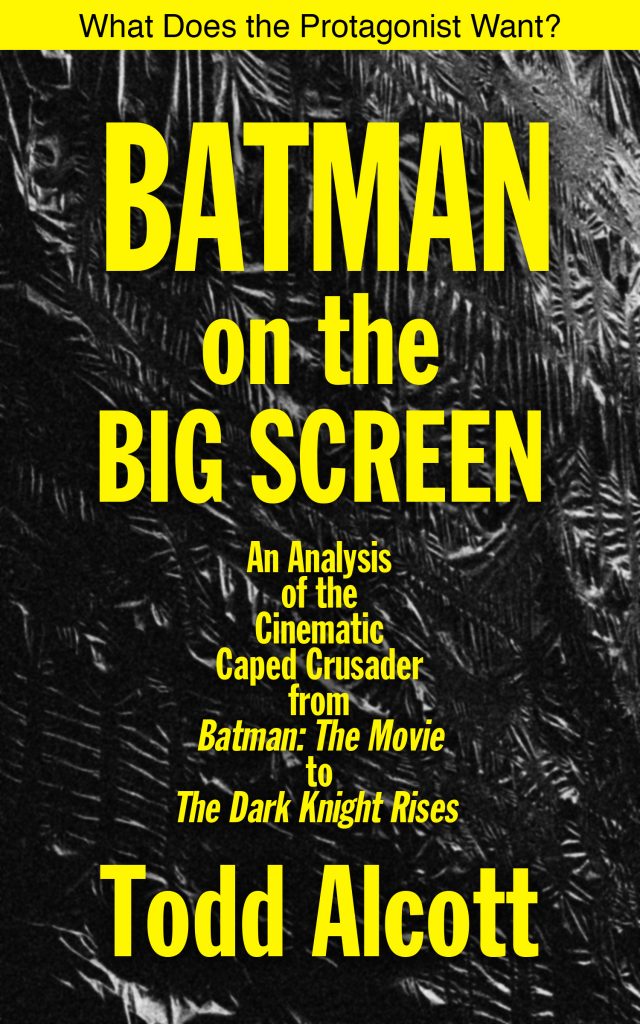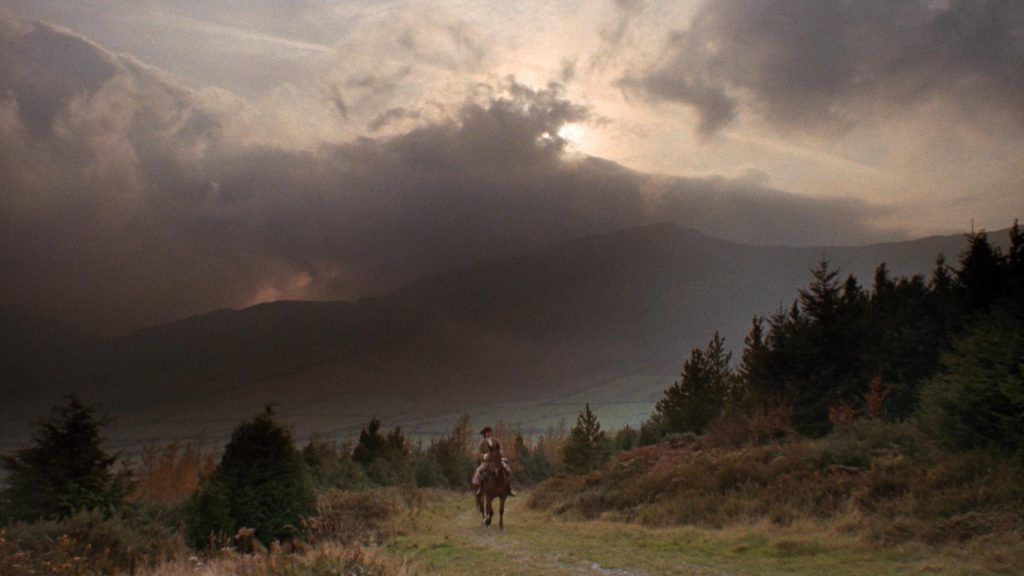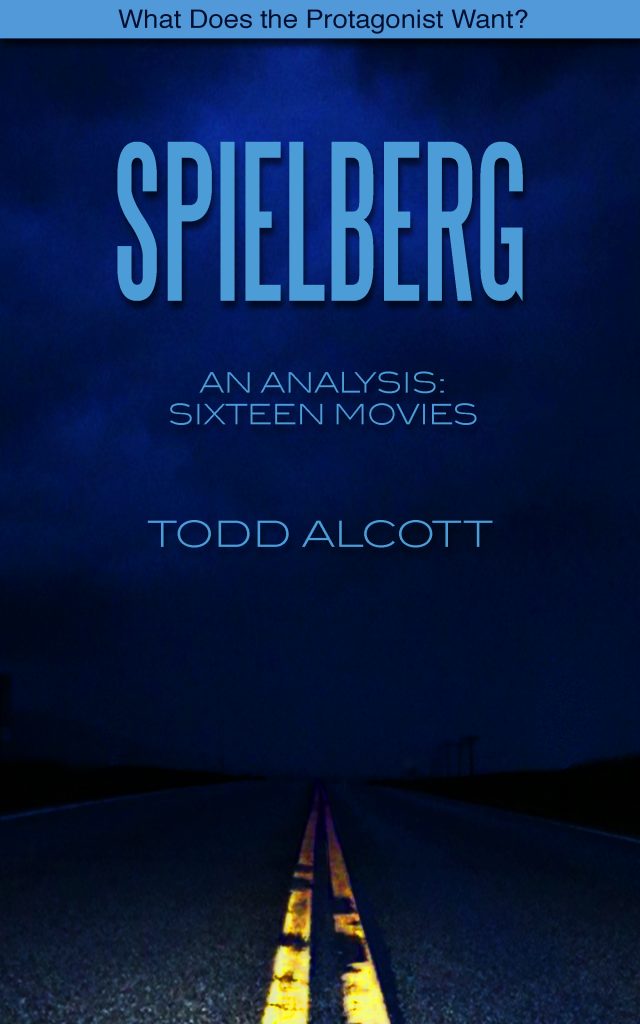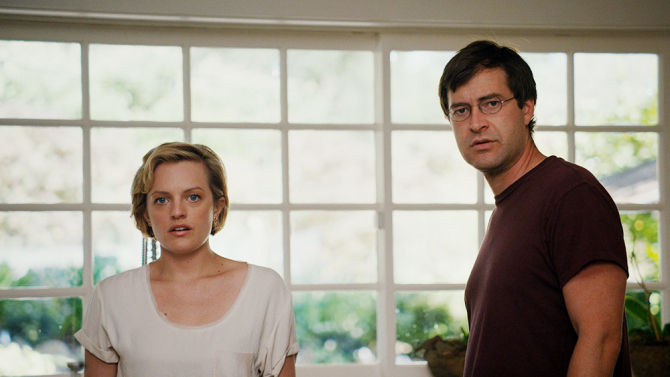Kubrick: Barry Lyndon part 2
Act I of Barry Lyndon takes about a half hour and has a total of thirteen scenes. Act II takes a little over a half-hour and twenty-six scenes — twice as many. Act I takes Barry from rash teenage hijinks to being on the run from the law, Act II takes him out of the fire, puts him, briefly, into a frying pan, and then back into a bigger fire, then puts him, briefly, into a comfy seat next to the fire, before throwing him headlong back into an even bigger fire.
SCENE 14: Barry sets out into the world. A tiny figure in a vast landscape, he heads toward Dublin and, he hopes adventure. The narrator informs us that Barry immediately forgets about Nora, for whom he threw his entire life into a cocked tricorn hat. While the circumstances of his ejection from his home may have been violent and stupid, he now feels pretty good about himself. He has 20 pounds in his pocket and is out to see the world, a young man with a toehold on social mobility.
Kubrick: Barry Lyndon part 1
At the request of absolutely no one, but on the occasion of Criterion’s release of their edition of Kubrick’s 1975 costume drama, I’ve decided to sit down and try to tackle this most perplexing and misunderstood of Kubrick’s movies.
WHAT DOES THE PROTAGONIST WANT? Redmond Barry, as he is known in the first half of the movie, is torn between two conflicting desires. At the one end is “love,” which he desires strongly, and at the other end is “social mobility,” which, as life inflicts itself upon him, he gradually comes to desire more and more.
Kubrick lets us know, before the movie even starts, that his subject here is social mobility. A title card announces that the first half of the movie will tell us how Redmond Barry, local nobody, gradually comes to be known as fabulously rich guy Barry Lyndon. As the narrative unfolds, we see how the conflicting impulses of love and social mobility come to define Barry’s journey, and how the ever-present threat of violence serves as a kind of lubricant for both desires.
Spielberg
My new volume of analysis, the double-sized, sixteen-movie volume on the films of Steven Spielberg, is now available for humans with eyeballs to read at Amazon.
Amazing at it sounds, Spielberg remains one of the most misunderstood, and underrated, directors of our time. If you’ve ever dismissed Spielberg, or thought “What’s the big deal?” or hated him for his whatever you hate him for, this volume will shed new light on his work. And if you’ve always liked his work but didn’t know why, this book will also shed new light on his work. And if you’ve always loved his work, this book will still shed new light on his work. Guaranteed.
Coen Bros: Five Films
Now available at Amazon, for your reading pleasure, my analysis of No Country For Old Men, A Serious Man, True Grit, Inside Llewyn Davis and Hail, Caesar! Certainly five of the greatest movies released in the past decade. Endlessly watchable, endlessly rewarding of examination. Analytical readings of analytical screenplays from analytical writers. I especially recommend this volume for people who don’t “get” A Serious Man, Inside Llewyn Davis and Hail, Caesar!.
Batman on the Big Screen

Batman on the Big Screen, a volume collecting everything I’ve written about the Caped Crusader, is now for sale at Amazon. It’s the first in what will be a long line of volumes under the What Does The Protagonist Want? banner. Having just finished editing it, I can tell you, it’s still highly addictive reading!
some thoughts on The One I Love
It’s a fairly common occurrence for me that a young talent will come to me and ask me how to break into the biz. Since I’ve made several movies, make my living as a full-time writer and still don’t know “how to break into the biz,” I’m never sure what to say.
I do know this: it’s hard to get a movie made. The maze an idea has to go through from idea to multiplex is so long, so convoluted and so fraught with peril, that almost no ideas whatsoever make it all the way. The multiplex hit is a property designed from the top down, the corporation that owns the studio says “We need to see X amount of profit, or you’re out of business.” The studio then says “We need to take zero risks in our release schedule, we can only make huge movies that will play well internationally and will bring in lots of money through ancillaries for a long long time.”
So, if you’re a young talent and you’re expecting to “break into the biz,” the odds are stacked hugely against you. The studio is giving the jobs that matter to people who have already proven themselves to be talented filmmakers.
And so, the thing I say to the young talent who wants to break into the biz is: “Make your own work.” No one is going to give you a job writing or directing a movie; write and direct the movie yourself.
It’s never been easier. Cameras are dirt cheap, computer memory even cheaper, and your phone probably has an editing program more sophisticated than AVID. And the internet is right there, demanding to be fed content every day, 24 hours a day.
If you’d like an example of the perfect movie to make, go see The One I Love. It has one location, two actors, and a lovely corkscrew of an idea that means that the one-location, two-actor movie doesn’t feel like a play. It’s a movie, and it could only be a movie.
I’m glad that The One I Love has the production values it does, but whatever its budget was, it could have been lower. It could have been nothing. The script could have been shot with a consumer-level camera in a single apartment. The movie is in the idea. Because the idea is so strong, the script could have withstood almost any production values at all and would still have worked narratively and dramatically.
Point is, production values are nice and all, but the first thing you need is a great idea that gives rise to a great script. Stick to those things and you don’t need car chases, alien invasions, “great cinematography” or anything else, you’ll be on your way. And you don’t have to shoot it in a house, just about everyone has a unique location available to them. If you have a boat, write a movie that takes place on a boat. If you have an RV, make a movie that takes place in an RV. If you have an abandoned castle nearby, use that. The movie Killing Zoe got made because the producer had access to an abandoned bank that was about to be demolished, so he asked Roger Avery to write a movie that takes place in a bank.
Use what ever is around you, and use your lack of funds to your advantage. Start with an idea, write a movie that’s simple to shoot, and shoot it. Then you’ll have a movie people can see, and if you’ve done your job you won’t need to break into the biz, the biz will come looking for you.
Some thoughts on the state of screenwriting in 2013
It was a great weekend for American filmmaking. Gravity is a solid thriller, made by a great director, Alfonzo Cuaron, a man with a bold cinematic vision, backed by a fearless producer, David Heyman, who ushered Cuaron’s vision to the big screen, produced in collaboration with a huge studio, Warner Bros, who supported Gravity‘s vision and ushered it into theaters with a hugely effective marketing push. Miracle of miracles, the movie made a ton of money and will continue to do so. Because Gravity fulfills one of the essential qualities of commercial filmmaking in 2013: you gotta see it in a movie theater. This is a movie that will not be the same experience when you’re watching it on your phone while waiting in line at the grocery store.
Here’s the thing: in an ideal world, Gravity would be an average American movie. Why isn’t it?
Read more
Some thoughts on Annie Hall and romantic comedies in general
mimitabu writes:
"Do [romantic comedies] usually have a protagonist? what does s/he usually want? "Get back into a family"? "Find happiness"? "Get over my ex"? "Become a better person so i can be a better father/mother"? Then i thought about the best romantic comedy, Annie Hall. i thiiiink you once wrote here that it has brilliant script, but i don’t believe you’ve ever posted an in-depth analysis of it. Does it have a protagonist? Is it Alvy? What does he want? "To get the eggs"? Is he just living out some sort of narcissistic pathology? Are there rules that Annie Hall follows that other successful romantic comedies also follow? If so, do they do away with the idea of a protagonist altogether?
Read more
The act thing
Can we see a break-down of the concepts behind the Multiple Acts school of writing? I’ve had the idea of three acts only shoved down my throat for years and it feels wrong to try to shoehorn a story into this particular artificial construct. Is there some magic number of acts, or do you just need to make sure your story has a beginning and an ending of some sort and build from there or something else entirely? — quitwriting
Completely agreed. I don’t fully understand what makes one act disparate from the next. — erranthope
I’d be interested to see this as well. — stormwyvern
I currently define an act as when the status quo changes into something else, and those changes are irreversible...How many acts, though? My answer right now is "however many you need to tell the story". — Kent M. Beeson
Let me answer this the best way I know, by telling a story:










